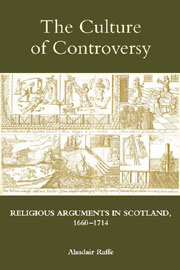Book contents
- Frontmatter
- Contents
- List of Maps and Illustrations
- Acknowledgements
- Abbreviations and Conventions
- Map 1 Scottish counties
- Map 2 Presbyteries, 1660–1714
- Introduction
- Part I Controversial Discourse
- 3 The Covenants and Conscientious Dissent
- 4 Persecution
- 5 Fanatics and Enthusiasts
- 6 Clerical Reputations
- Part II Controversial Action
- Conclusion: Concepts and Consequences
- Glossary
- Bibliography
- Index
- STUDIES IN MODERN BRITISH RELIGIOUS HISTORY
5 - Fanatics and Enthusiasts
from Part I - Controversial Discourse
Published online by Cambridge University Press: 05 February 2013
- Frontmatter
- Contents
- List of Maps and Illustrations
- Acknowledgements
- Abbreviations and Conventions
- Map 1 Scottish counties
- Map 2 Presbyteries, 1660–1714
- Introduction
- Part I Controversial Discourse
- 3 The Covenants and Conscientious Dissent
- 4 Persecution
- 5 Fanatics and Enthusiasts
- 6 Clerical Reputations
- Part II Controversial Action
- Conclusion: Concepts and Consequences
- Glossary
- Bibliography
- Index
- STUDIES IN MODERN BRITISH RELIGIOUS HISTORY
Summary
This chapter examines arguments over the pejorative religious labels ‘fanatic’ and ‘enthusiast’. A hostile epithet, ‘fanatic’ was used of a variety of people whose principles or backgrounds placed them outside the boundaries of political acceptability after the Restoration. The term predated Charles II's return to the throne, but the meanings of ‘fanatic’ and its related adjectives and nouns evolved in line with the changing political and religious structures of the early 1660s. Within a few years of the restoration of episcopacy, supporters of the establishment were regularly identifying presbyterian dissenters as fanatics. Moreover, presbyterians were also described as ‘enthusiasts’. Because Scottish historians have largely overlooked the concept of religious enthusiasm, this chapter surveys its significance in seventeenth-century English culture, to provide a context for Scottish debates. The label ‘enthusiast’ was originally used to refer to heterodox protestants claiming personal inspiration by the holy spirit. But critics of ‘enthusiasm’ increasingly associated it with more conventional Calvinist notions of conversion and prayer. While presbyterians remained committed to these concepts across our period, episcopalians were influenced by the reaction in the Church of England against Calvinist theology and piety. By the end of the seventeenth century, therefore, debates about enthusiasm increasingly reflected the theological and devotional divergence between presbyterians and episcopalians. Behind a facade of name-calling, Scottish religious controversy was fuelling the development of rival confessional cultures.
- Type
- Chapter
- Information
- The Culture of ControversyReligious Arguments in Scotland, 1660-1714, pp. 121 - 148Publisher: Boydell & BrewerPrint publication year: 2012

